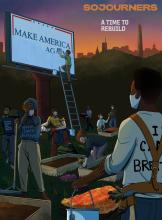FOR BLACK people in the U.S.—a collective from which lives are still stolen on a daily basis, as though the slave-boat travels of 1619 never ended but merely set course in new directions to the same destination—reclamation is essential. Perhaps our history motivated the poet Nikky Finney’s father to repurpose a phrase that long had a negative connotation into a moniker to give his daughter positive focus.
“My mother steeped us in the stories of Black history and my father named me ‘Love Child’ in order not to give anyone else the opportunity to distract me from what I had come to earth to be,” writes Finney, winner of the 2011 National Book Award for Poetry, in her newest collection, Love Child’s Hotbed of Occasional Poetry. “So be she.”
And so she is. About a month into quarantine 2020, Finney released perhaps the most history-and-affection-freighted book to be published this harrowing year. Love Child’s Hotbed cannot be read on a Kindle. Less a typical, slender publication of modern verse, and more a hefty coffee-table book of startling import, it brings to mind The Black Book, that historical anthology co-edited in 1974 by Toni Morrison, the eventual Nobel laureate in literature who was an editor at the publishing company Random House. A book that strove to contain the vast lives of Black people in the U.S.—their horrific experiences and their magnanimous achievements—The Black Book was a gift to the nation’s children and grandchildren of slaves (and even inspired one of the greatest novels of all time, Morrison’s Beloved). Likewise, in a time of immense death and thus plundering of families, Finney’s latest book is a blessing for a continuously undone but never destroyed people, reaching into the past to grasp hope and self-worth to sustain their future.
Read the Full Article

